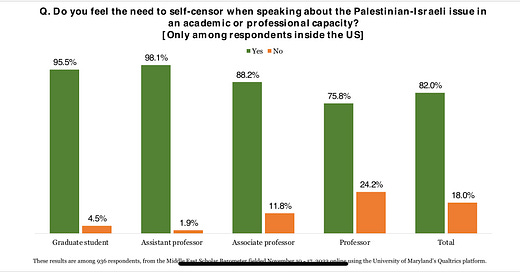Gaza and Academic Self-Censorship
Our new Chronicle essay reveals eye-opening results from the new Middle East Scholars Barometer survey.
Shibley Telhami and I have a piece out this morning in the Chronicle of Higher Education (my first ever in that great publication) on the impact of the politics surrounding Israel’s war on Gaza on academic experts on the Middle East. We draw on the results of the latest wave of the Middle East Scholars Barometer, fielded in mid-November with 936 responses (including members of MESA, APSA, POMEPS, AHA and AIS; two thirds from scholars based in US institutions and the rest outside the US). It’s the sixth time we’ve run the survey; you can see the earlier results here.
Here’s the nutshell of our Chronicle essay, titled “Scholars Who Study the Middle East Are Afraid to Speak Out”:
The findings were stark: Eighty-two percent of all U.S.-based respondents, including almost all assistant professors (98 percent), said that they self-censor when they speak professionally about the Israeli-Palestinian issue. Just over 81 percent of those self-censoring said they primarily held back their criticism of Israel, while 11 percent said they held back from criticizing Palestinians. Only 2 percent said criticizing U.S. policy was the biggest issue.
We included the opportunity for open-ended responses to supplement the survey questionnaire. A number of respondents complained of a pro-Palestinian orthodoxy on their campuses or in professional associations, though, as the poll numbers indicate, more of the complaints were about limits on criticism of Israel. Almost all of the comments presented a bleak story of the marginalization and even outright repression of faculty who specialize in Middle Eastern issues.
The essay goes into detail based on the survey responses about how the long-running politicization surrounding Middle East Studies, often driven by external advocacy organizations, has escalated and mutated dramatically since October 7. Three quarters of the respondents say things have gotten worse. From what I see on campus, this toxic environment isn’t primarily driven by classroom dynamics or by ordinary students (who often tend to just stay quiet and try to stay out of the way of polarized activists) — as this fantastic piece by my GW colleague Arie Drubov and Shachar Pinsker argued recently in Haaretz. The survey shows that Middle East expert faculty tend to self-censor in roughly equal measure due to campus culture and fear of offending students, on the one hand, and fear of external advocacy groups on the other, with campus administration often playing an unconstructive role as they attempt to balance their multiple constituencies while losing sight of their core academic mission.
Most readers of this blog are probably familiar with the high-profile cases of pressures on faculty and students which have torn apart campuses such as Columbia, Penn, Harvard and GWU. The open-ended comments in our survey produced a remarkable outpouring of stories of lower level indignities which don’t make the headlines, with countless examples of scholars told not to speak to the media, left off of campus-wide panels and events, or keeping quiet to avoid reprisals from colleagues or campus administrators. Overall, in my view at least, campus administrators — from college and university presidents down to department chairs — need to do a heck of a lot better to protect campus freedom of speech for faculty and students, push back on external pressure campaigns, and value the research expertise of their faculty. Right now, the survey suggests, in too many institutions that isn’t happening.
Read the whole thing at the Chronicle and check out the full results here; we will have more to say about both the survey and the broader issues soon.




